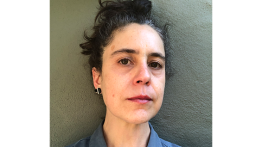Natalia Brizuela, "O futuro é ancestral - The Future is Ancestral"
Tuesday, October 26, 2021, 7 - 8:30pm

As part of the Fall 2021 Intra-Disciplinary Seminar series, Natalia Brizuela will seek to complicate the notion of “aftermath” which is usually inscribed in a Western linear conception of time as a projection, and points, like an arrow, to a future that is to come afterwards, a future we must invest in and create. In coexistence to this notion of time as progress, other notions of temporality exist that can allow us to envision an aftermath that is ancestral, that is already here, that has been here all along and continues to be activated, that carry with it horizontal social relations and a strong ecological dimension. Brizuela is thinking of the indigenous temporalities, or rather cosmogonies, and those which animate the quilombos and many sites of Black struggle and resistance in the genealogies of maroon communities.
Natalia Brizuela writes and teaches about visual culture, art, film, media, literature and critical theory from Latin America, with a particular focus on experimental practices that bridge aesthetics and politics. She is the author, among others, of Fotografia e Imperio (2012), Depois da fotografia (2014), The Matter of Photography in the Americas (2018) and La cámara como método (2021), and has curated numerous exhibitions and film programs. She is currently preparing the exhibition How to Change Everything (La Mama, 2022) and finishing a book on the refusal of Time. She is Class of 1930 Chair of the Center for Latin American Studies at UC Berkeley, and a Professor of Film & Media and Spanish & Portuguese.
The IDS public lecture series is part of the Robert Lehman Visiting Artist Program at The Cooper Union. We are grateful for major funding from the Robert Lehman Foundation. The IDS public lecture series is also made possible by generous support from the Open Society Foundations.




